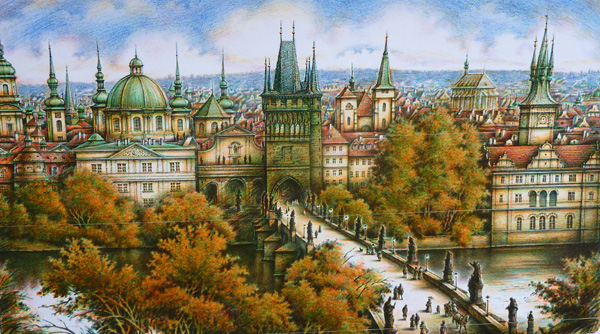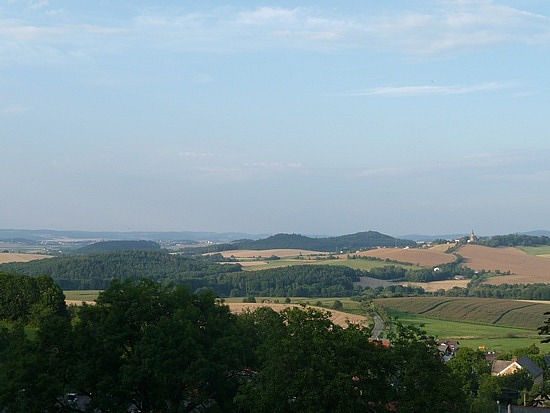Posts Tagged ‘Communism’
Prague: At War and at Peace

Photo from Painting
View of the Charles Bridge looking toward the main city centre. Paintings, sketches and drawings, such as the one above, depict various scenes around the city. Many are the work of talented young people trying to make their way in life. For a small donation, the artist allows pictures to be taken.
What ever direction you might travel in Eastern Europe, a few days in Prague is a must. For Esther, Garth, Lynn and I, a four day extension of our Danube trip was barely enough, however we did manage to savour every last second. We would have gladly stayed for another week just to touch upon the many things that still awaited our eager senses but, alas, time (and booked flights) conspired against our wishes. For other travelers we highly recommend a minimum of one week, perhaps ten days if you can squeeze out the time. A three month stay in Prague and the surrounding country would be heaven.
As with many cities and countries in Eastern Europe emerging from thirty five years of war (World War I and II), then forty-one years of communism, peace comes with a cost, but that cost seems worth every penny in hard cash, blood, sweat and tears. Around the world we see these costs being paid everyday for a small taste of that elusive dream we call freedom. (Reference Footnote on Quebec Student Protests).
these costs being paid everyday for a small taste of that elusive dream we call freedom. (Reference Footnote on Quebec Student Protests).
Photo (Web): This is typical of the foothill farm country through which we passed. Many of the farms along the highway had seen better times.
Our four hour bus trip from Passau, Germany then across the southern Republic, left no doubt this was a country once held by iron fists, first those of the Nazi’s during two World Wars, then during the decades of an equally brutal Soviet communist dictatorship. As we crossed the now open border from Germany, warnings were still in place advising tourists of the danger of land mines in a strip of ‘no man’s land’ between the two countries and at our one stop for refreshments at a small, remote service station, the feeling of being in another time and another place was clearly evident.
While the countryside was beautiful, much as it is in the foothills of Alberta, the mix of worn down buildings, old railway stations and broken shelters, serve as a reminder of those decades of death and brutal repression. A few stark examples of how ordinary people suffered; following the Nazi occupation, it is estimated over 155,000 persons of Jewish descent (86% of the population) died in the streets, at concentration camps or during ‘death marches’ that took place near the end of the war.
(837)
